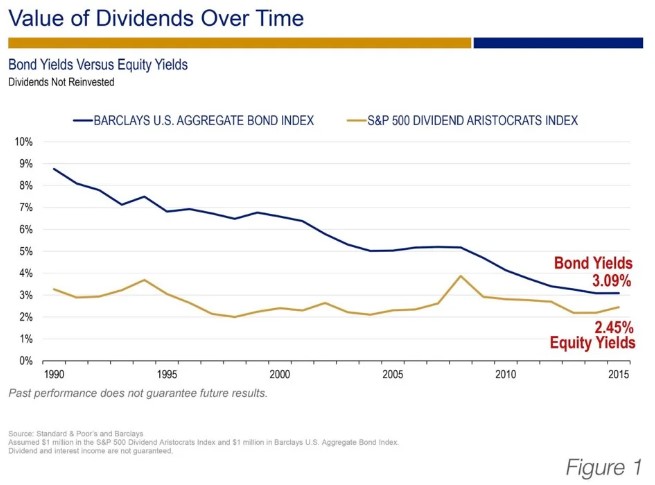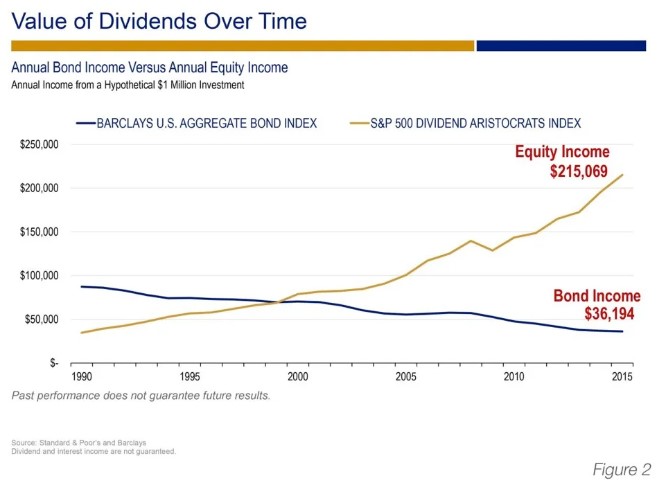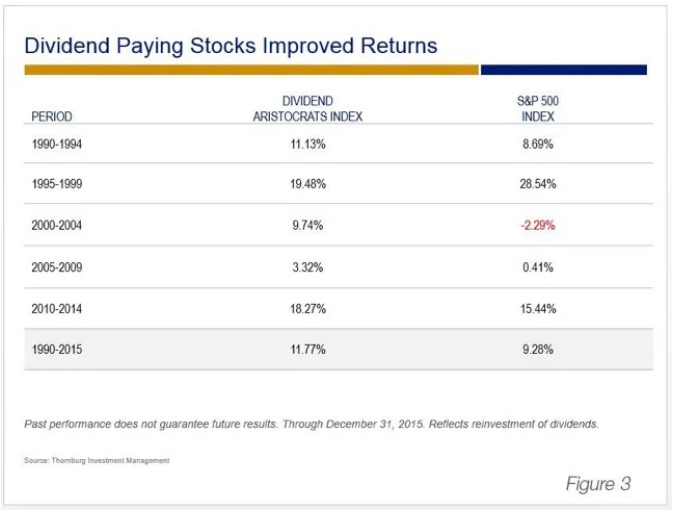Dividend-Paying Stocks: An Investor's Swiss Army Knife
You can add current income, capital appreciation and tax advantages to your portfolio with this one type of investment.


Profit and prosper with the best of Kiplinger's advice on investing, taxes, retirement, personal finance and much more. Delivered daily. Enter your email in the box and click Sign Me Up.
You are now subscribed
Your newsletter sign-up was successful
Want to add more newsletters?

Delivered daily
Kiplinger Today
Profit and prosper with the best of Kiplinger's advice on investing, taxes, retirement, personal finance and much more delivered daily. Smart money moves start here.

Sent five days a week
Kiplinger A Step Ahead
Get practical help to make better financial decisions in your everyday life, from spending to savings on top deals.

Delivered daily
Kiplinger Closing Bell
Get today's biggest financial and investing headlines delivered to your inbox every day the U.S. stock market is open.

Sent twice a week
Kiplinger Adviser Intel
Financial pros across the country share best practices and fresh tactics to preserve and grow your wealth.

Delivered weekly
Kiplinger Tax Tips
Trim your federal and state tax bills with practical tax-planning and tax-cutting strategies.

Sent twice a week
Kiplinger Retirement Tips
Your twice-a-week guide to planning and enjoying a financially secure and richly rewarding retirement

Sent bimonthly.
Kiplinger Adviser Angle
Insights for advisers, wealth managers and other financial professionals.

Sent twice a week
Kiplinger Investing Weekly
Your twice-a-week roundup of promising stocks, funds, companies and industries you should consider, ones you should avoid, and why.

Sent weekly for six weeks
Kiplinger Invest for Retirement
Your step-by-step six-part series on how to invest for retirement, from devising a successful strategy to exactly which investments to choose.
Tradeoffs are a fact of life. Every time we make a decision, we weigh the positives and negatives of one choice against another. And even though we go through that sometimes painstaking exercise, there are times when the choice we make doesn't fully eliminate the desire we had for the option we didn't choose.
Consider the tradeoffs your hypothetical friend made when she decided where to vacation this summer. She always loves going to the mountains, but this year she was equally interested in spending a week in New York City. The mountains offer beauty, peacefulness, nature and solitude. The city offers activity, entertainment, museums and great restaurants. This year the vacation in the mountains won, but that doesn't mean she isn't still dreaming about a meal at her favorite restaurant or that she's stopped wishing she'd gone to see "Hamilton."
As an investor, you may feel like you've had to make tradeoffs along the way. You probably worked with your financial adviser to choose investments that offered you the potential for the income, appreciation and tax benefits you needed to help you achieve your goals. Of course, no one investment does it all. That's one of the main reasons you're diversified.
From just $107.88 $24.99 for Kiplinger Personal Finance
Become a smarter, better informed investor. Subscribe from just $107.88 $24.99, plus get up to 4 Special Issues

Sign up for Kiplinger’s Free Newsletters
Profit and prosper with the best of expert advice on investing, taxes, retirement, personal finance and more - straight to your e-mail.
Profit and prosper with the best of expert advice - straight to your e-mail.
But one investment, over the long-term and through all types of markets, has delivered a number of the benefits you've been seeking. What is it? Dividend-paying stocks.
Dividend-paying stocks
As she prepared for her journey, your friend focused on packing light. She knows that the less weight she has to carry, the easier it will be for her to focus her energy on the task at hand. So instead of taking along a number of heavy tools, she opted for one that has many uses: a Swiss Army knife.
Like a Swiss Army knife, dividend-paying stocks provide investors with a number of benefits—three, in particular, that may eliminate the need for tradeoffs. They include:
1. Current income that may grow over time
Historically, investors have purchased equities, or stocks, which represent proportional ownership in a company, hoping their shares will appreciate in price as the company becomes more profitable. But stocks may deliver other benefits as well. As companies prosper and mature, they often decide to share some of their profits with shareholders in the form of cash dividends, though this is not guaranteed. Like bond interest payments, cash dividends represent a current form of income. Unlike bond interest payments, which remain fixed for the life of the bond, cash dividends paid to equity shareholders may grow over time.

For many years, investors have lived in a declining interest-rate environment. Figure 1 (above) demonstrates that between 1990 and 2015 bond yields, as illustrated by the yield on the Barclays U.S. Aggregate Bond index (composed of approximately 8,000 publicly traded bonds including U.S. government, mortgage-backed, corporate and Yankee bonds weighted by the market value of the bonds in the index), dropped from a high of nearly 9% to 3.09%. Over the same period, equity yields, as illustrated by the dividend paid on the Dividend Aristocrats index declined from just over 3% to 2.45%. The Dividend Aristocrats Index includes large cap, blue chip U.S. companies within the S&P 500 Index that have consistently increased their dividends for the past 25 years.
If you're an investor who invests for income, this declining interest-rate environment is challenging and disappointing. But, before you toss in the towel, take a look at Figure 2 (below).

Instead of focusing on what's happened with yields as a percentage, Figure 2 shows the amount of income a hypothetical investment (investors may not make direct investments into any index) of $1 million in the Barclays U.S. Aggregate bond index or the Dividend Aristocrats Index would have generated over the same time period as Figure 1.
As the chart illustrates, the income generated from that hypothetical $1 million investment in the Barclays bond index would have dropped from about $90,000 per year in 1990 to just under $37,000 in 2015, while the dividend-paying stocks within the dividend index would have increased from approximately $30,000 in 1990 to slightly more than $215,000 in 2015.
2. Potential capital appreciation
In addition to possibly generating a current income stream that has the potential to grow over time, dividend-paying equities also provide investors with the opportunity to grow the value of their investment over time. Figure 3 (below) compares the total return of the Dividend Aristocrats and the S&P 500 Index during different time periods. When you compare the returns in each of the periods, the stocks in the Dividend Aristocrats outperformed the stocks in the S&P 500 during every period except the five years between 1995 and 1999 (which was a time of rampant speculation that drove the prices of many stocks to unsustainable levels).

3. Potential tax-advantaged income
Finally, according to the United States Internal Revenue Code, cash dividends investors receive from equities may qualify to receive tax-advantaged treatment. As a result, ordinary cash dividends paid to shareholders that meet specific criteria may be taxed at the lower long-term capital gains tax rate rather than at the higher rate that's applied to an individual's ordinary income. It should be noted that everyone's tax situation is different and this should not be considered tax advice. You should consult your tax advisor for personal tax concerns.
None of this means you should have a portfolio that is comprised entirely of dividend-paying stocks, but it does mean that dividend-paying stocks are a very versatile investment that you may have previously overlooked. Tradeoffs may be a fact of life, but when it comes to investing, you may not have to make as many as you originally thought.
Related Content
Profit and prosper with the best of Kiplinger's advice on investing, taxes, retirement, personal finance and much more. Delivered daily. Enter your email in the box and click Sign Me Up.

Jan Blakeley Holman is director of advisor education at Thornburg Investment Management. She is responsible for identifying and creating advisor education programs that support financial advisors as they work with their clients and prospects. Jan has spent more than four decades in the financial services industry. Over the course of her career, she’s served as a financial advisor, an advisor to financial advisors and a financial services corporate executive. Visit Thornburg’s website to enjoy more of Jan’s articles and podcasts.
-
 Ask the Tax Editor: Federal Income Tax Deductions
Ask the Tax Editor: Federal Income Tax DeductionsAsk the Editor In this week's Ask the Editor Q&A, Joy Taylor answers questions on federal income tax deductions
-
 States With No-Fault Car Insurance Laws (and How No-Fault Car Insurance Works)
States With No-Fault Car Insurance Laws (and How No-Fault Car Insurance Works)A breakdown of the confusing rules around no-fault car insurance in every state where it exists.
-
 7 Frugal Habits to Keep Even When You're Rich
7 Frugal Habits to Keep Even When You're RichSome frugal habits are worth it, no matter what tax bracket you're in.
-
 For the 2% Club, the Guardrails Approach and the 4% Rule Do Not Work: Here's What Works Instead
For the 2% Club, the Guardrails Approach and the 4% Rule Do Not Work: Here's What Works InsteadFor retirees with a pension, traditional withdrawal rules could be too restrictive. You need a tailored income plan that is much more flexible and realistic.
-
 Retiring Next Year? Now Is the Time to Start Designing What Your Retirement Will Look Like
Retiring Next Year? Now Is the Time to Start Designing What Your Retirement Will Look LikeThis is when you should be shifting your focus from growing your portfolio to designing an income and tax strategy that aligns your resources with your purpose.
-
 I'm a Financial Planner: This Layered Approach for Your Retirement Money Can Help Lower Your Stress
I'm a Financial Planner: This Layered Approach for Your Retirement Money Can Help Lower Your StressTo be confident about retirement, consider building a safety net by dividing assets into distinct layers and establishing a regular review process. Here's how.
-
 The 4 Estate Planning Documents Every High-Net-Worth Family Needs (Not Just a Will)
The 4 Estate Planning Documents Every High-Net-Worth Family Needs (Not Just a Will)The key to successful estate planning for HNW families isn't just drafting these four documents, but ensuring they're current and immediately accessible.
-
 Love and Legacy: What Couples Rarely Talk About (But Should)
Love and Legacy: What Couples Rarely Talk About (But Should)Couples who talk openly about finances, including estate planning, are more likely to head into retirement joyfully. How can you get the conversation going?
-
 How to Get the Fair Value for Your Shares When You Are in the Minority Vote on a Sale of Substantially All Corporate Assets
How to Get the Fair Value for Your Shares When You Are in the Minority Vote on a Sale of Substantially All Corporate AssetsWhen a sale of substantially all corporate assets is approved by majority vote, shareholders on the losing side of the vote should understand their rights.
-
 How to Add a Pet Trust to Your Estate Plan: Don't Leave Your Best Friend to Chance
How to Add a Pet Trust to Your Estate Plan: Don't Leave Your Best Friend to ChanceAdding a pet trust to your estate plan can ensure your pets are properly looked after when you're no longer able to care for them. This is how to go about it.
-
 Want to Avoid Leaving Chaos in Your Wake? Don't Leave Behind an Outdated Estate Plan
Want to Avoid Leaving Chaos in Your Wake? Don't Leave Behind an Outdated Estate PlanAn outdated or incomplete estate plan could cause confusion for those handling your affairs at a difficult time. This guide highlights what to update and when.